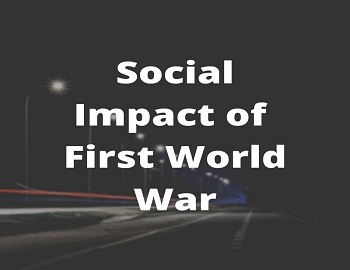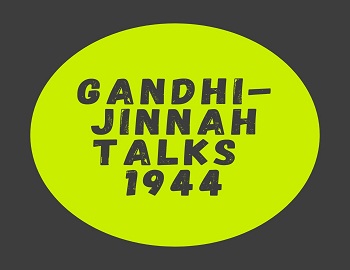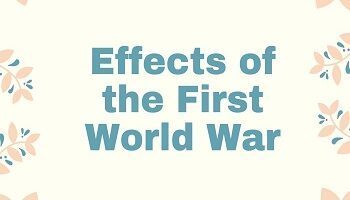Table of Contents
Social Impact of First World War:
Attempts to Solve the Problem of Minorities:
The most formidable problem that faced the Peace Conference at Paris was how to safeguard the interests of the minorities permanently residing in foreign countries. This was a problem not only in the new states of Poland and Czechoslovakia but also in Austria, Hungary, Bulgaria and Turkey. Many people had permanently settled in these countries who from the point of view of nationality were not their natives. The Peace Conference of Paris forced Poland and Czechoslovakia to guarantee the safeguard of the language, religion and culture of the minorities permanently residing in their countries, but Poland, Czechoslovakia, Greece, Yugoslavia and Turkey were not prepared to give such undertaking. They thought that it not only thwarted their sovereignty but also created disruption in their states. These states wished to assimilate the minorities into a nationalistic point of view, but England and America insisted that their interests be fully protected. Because of this division of opinion, this task was handed over to the League of Nations. The League of Nations signed separate treaties with these states but this did not provide any permanent solution to the problem of minorities and they maintained their separate identity.
Change in Women’s Status:
To meet the growing demand for soldiers during the war millions of men left their jobs and joined military services and to take their place in mills and factories, shops and offices and industries women stepped in. They also reached useful service on the battlefield by nursing the wounded soldiers. Thus they came out of the narrow bonds of family life and entered the life of economic development and proved their competence by working hard. This increased their self-confidence and they became aware of their importance. They became politically conscious and began to demand their political rights. As a consequence of this in 1918 England passed the Representation of Public Act according to which women above 30 years of age were granted a franchise. The same right was granted by Russia in 1917 and by Germany in 1920.
Equality of Races:
By the close of the nineteenth century, the European people had a strong sense of superiority of their race and colour and looked down upon the black, brown and yellow peoples of Asia and Africa and considered them inferior. But exigencies of war forced them to recruit soldiers in India, Japan and Africa and send them to Europe where they showed their valour equal to the white soldiers. This nullified the idea of the superiority of European races. “All races are equal, none is superior or inferior”- this idea fostered the development of internationalism and peace and prosperity throughout the world.
The Illusion of Religious Supremacy:
The First World War adversely affected the sense and sensibility of many people. People believed that only a severe religiosity could prevent the horrors of war, but the events of the war-shattered that belief. During the war, the churches on both sides preached that the cause expounded by their country was just and righteous and prayed to God to grant them victory. France, Germany and Austria were all Christain countries. They all believed in the same God, the same scriptures and the same doctrines. Instead of serving the oppressed humanity, the clergy in these countries overpowered by loyalty to the state began to justify the government action whether right or wrong and preached that the highest religious duty of the people was to give unstinted support to their country during the War. Clergy on both sides preached the same thing in the name of Christianity. What a loathsome mockery of God and religion! The progress of science had already generated a sort of disbelief in Christianity in the public mind. The war aggravated this feeling. People leaned towards agnosticism and atheism.
Development of World Organizations:
Several world organizations came into existence to solve social, economic and political problems caused by the First World War. Efforts were made to stop drug trafficking; International Labour Organization was formed for the welfare of the labourers and the League of Nations for the solutions of political problems. This developed a sense of internationalism.









Comments (No)